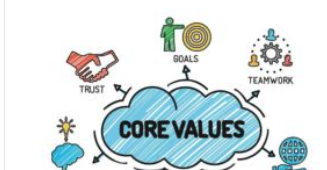A packed room of two hundred people at an industry conference. A table of five at a working lunch. An unexpected introduction at a decidedly non-work function. Ready to make it work for your business? Do you know what you have to do? Networking! It comes easy for some, yet can be painfully difficult for others. Putting yourself out there and meeting new people can be very intimidating, especially in business situations. The ability to build relationships through networking is a critical tool to getting both your name and your products and services out of your office or work area and into the public domain. By building a successful network, you have access to endless opportunities and tools that can improve your business.
So where does it start? The first step is communication, and the ability to effectively communicate with someone can make or break your network before it ever really begins to form. For me, it starts with a fundamental set of attributes; respect and compassion, checking your ego at the door, and truly listen, doing whatever has to be done to really hear what the other person is saying. The business world can be a scary place, but there is no way to get anything out of it if we are only concerned about our own ideas and thoughts.
As a business owner, I know it can be easy to get caught up in your work. It has a tendency to overshadow other things, but your relationships should be priority one. And like most things of value, they take a lot of work to maintain; get together, catch up, get to know them personally, and really understand them. Work to get beyond just the surface and work to build deeper connections. Life happens, and it is so easy to let our own needs get in the way of maintaining our connections, but when we recognize that networks have the power to transform individuals and businesses alike, the value proposition is easy to see.
A Network Relationship = Any Other Relationship
Networks, like any other kind of relationship building, take time and effort. They aren’t just things you can expect to fall into your lap or appear at the snap of a finger. For those of you new to networking or looking to build a personal network of your own, it takes some time, but you can start by asking for help. In a networking situation, people expect you to ask them for help. If you turn that around and just offer some support, your networking partner will be grateful and want to return the favor. We are all out there looking for the same thing; ways to improve our business. If you put yourself out there and offer your services you are bound to find someone in need of your support, and that one person can open doors to many other contacts and networking opportunities that you wouldn’t otherwise know of if you didn’t venture out of your comfort zone.
A key aspect of effective networking, and to relationships in general, is that every interaction and transaction is not something that you are always going to benefit from. You don’t always have to gain something direct and tangible in a networking relationship. If you can introduce people who can benefit from one another, it’s just as effective. It is all about the give and take, and sometimes you may help facilitate something that in no way directly benefits your business right now, but will pay tremendous dividends in the long run.
Kicking it into Gear
Once you have developed your own personal network, it’s now time to develop a strategy for maintaining it. Networks and relationships are much more like gardens, much less like monuments; they need constant tending and care, and without that what you’ve worked so hard to create will slowly disappear. It’s important to take the person that you are making these connections with into consideration and be mindful of the fact that they are people too, not just business advancing opportunities. Get to know people for who they are and recall little fun facts about them; their birthday, their families, favorite foods. As I mentioned before, moving beyond the surface and developing deeper emotional connections is when the fun starts, and the value of the relationship you’ve built really starts to become evident.
It can be a warm and fuzzy feeling when you get a text or email from a coworker wishing you a happy birthday, or someone brings up a funny story you told them at a meeting a month ago, because it shows that they care. These are people that you can rely on to help benefit your business and it will only make the journey easier if you can truly value them as both a business relationship and as an individual.
I have worked hard to develop and maintain Incipio’s network and I’m constantly working to improve it even further. Networks deliver three unique advantages: private information, access to diverse skill sets, and power. Executives see these advantages at work every day, but might not pause to consider how their networks regulate them. We can often take these networking assets for granted, but for many successful businesses, their networks are their foundation and without them, they might not be where they are today. Networks are like a puzzle, and even when one piece is missing, the puzzle is incomplete.
Keeping Your Network in Check
Consider every relationship you have within your network to be just as important as the next; even if it may not offer as much to your business as others right now, at some point in the future it may prove to be invaluable.
To start, treat others the way you wish to be treated. We’ve all heard that before, but it carries a much stronger meaning in the business world, where potential clients or partners are all around us. Once you’ve established that solid relationship, it allows you to advance the relationship quality to the next level, where you treat them less how YOU wish to be treated and can focus more on treating them the way THEY wish to be treated.
Networking opportunities are everywhere, whether we are aware of it or not. This is why it is so important to always maintain the image of your business everywhere you go because you never know who you will run in to.
Networks have the power to work wonders, but they can also wreak havoc if managed inappropriately. We’re humans, and naturally we are selfish beings which is why it can be very easy to unknowingly overload our partners and networking sources with tasks and questions so that we can better our business. Once you start to develop your network it can begin to grow exponentially and it is our responsibility to keep it under control and prevent it from becoming a burden rather than a tool.
One of the biggest challenges that I have faced within my own personal network has been managing the growth and expansion of it. If people know you, then they have an ‘in’, and sometimes you don’t have the time to manage all the asks. Treat your network as if it was a significant other, establish boundaries and what you are and are not willing to do. This will prevent a lot of headaches in the future if you lay down your expectations at the start. This allows both parties to understand the perimeters before things get to be unmanageable.
We are all in this together, and as discouraged as we all may get sometimes, we all have our own unique assets that bring value to the bigger picture. If you run a business with a close-minded attitude and tend to only keep to your close-knit group of people, then expect to only have access to a limited amount of resources! There are so many opportunities out there, and to have a successful business it takes branching out and truly connecting with people. Speak, listen, and really hear what each other is saying. Don’t just wait for your turn to speak. Pausing to think about the words you just heard is OK. You never know what these people can bring to the table. If you’re only concerned with what you have to contribute to others rather than allowing others to be of support to you, then you’re only holding yourself, and your business back.
At the end of the day, the relationships that we build are the most important aspects of our lives. Thankfully this is no different in our work-lives; businesses are built by people and the relationships they form as those organizations are created. Those relationships expand further as partnerships are created, and this extends even more as clients and customers are brought into the picture. Investing in building strong relationships and expanding your personal and professional networks is critical to growing yourself and your business. Make sure you have a strategy to do both!







